Cambridge Nanjing Forum 2022 Held Successfully
On the afternoon of September 22, hosted by the University of Cambridge and Nanjing Jiangbei New Area Management Committee and organised by the Cambridge University - Nanjing Centre of Technology and Innovation ("CUNJC") and Nanjing Overseas Collaborative Innovation Center (Cambridge, UK), Cambridge Nanjing Forum 2022 - International Forum on the Commercialisation of Research came to a successful conclusion. Many memorandums of cooperation and an agreement were signed, in which various science and technology innovation enterprises expressed their intention to settle.
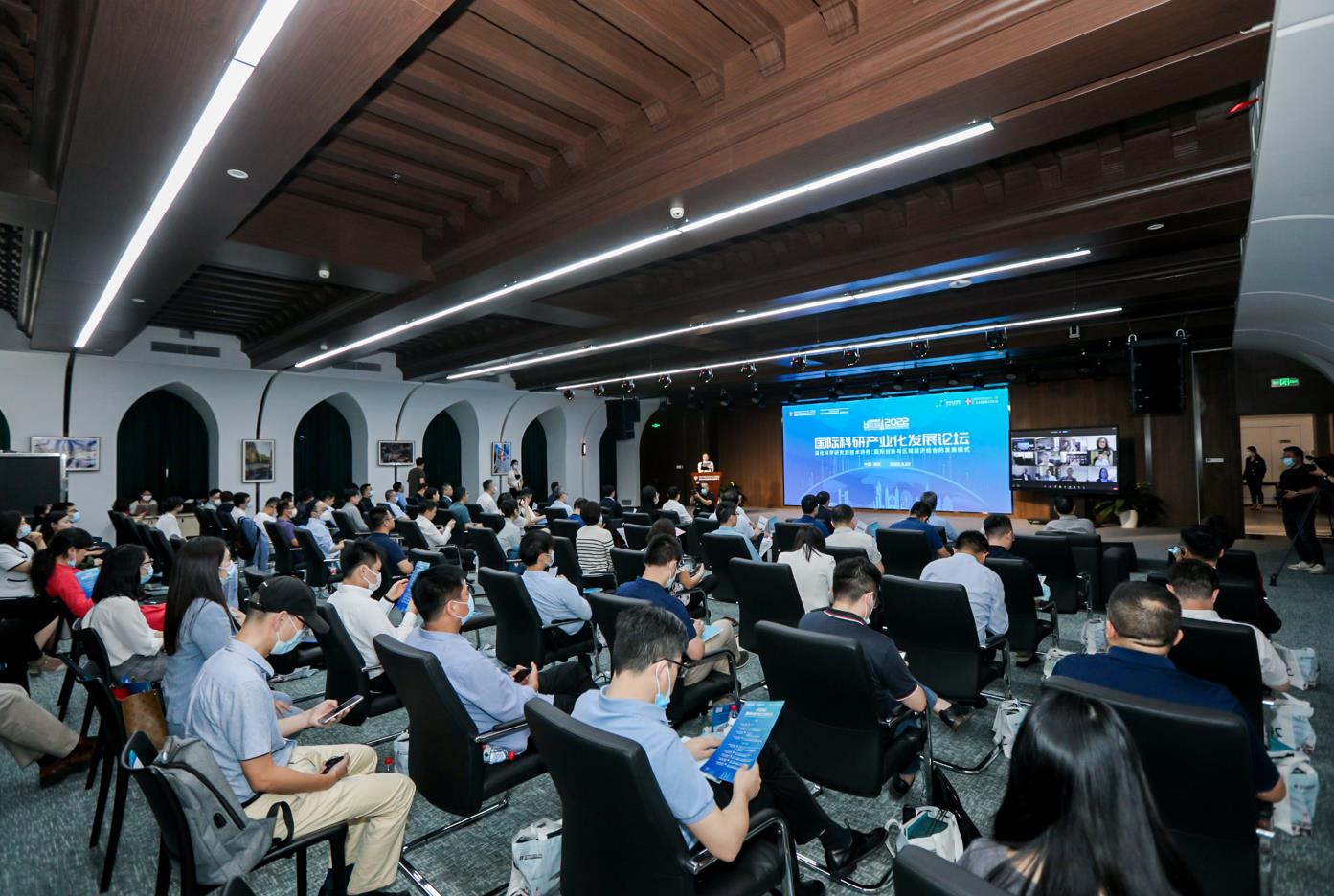
This year's forum was conducted in hybrid mode, focusing on "Deepening Scientific Research to Technology Transfer: The Development Model of Integrating World Science and Technology with Regional Innovation". Despite a geographical distance of 8,900 kilometres, nearly 200 guests from government agencies, industries, academia, research and investment circles discussed the new global paradigm of science and technology innovation.
Luo Qun, Vice Director and Deputy Secretary of the Party Group of Nanjing Municipal People's Congress, Wang Wei, Member of the Party Working Committee and Deputy Director of the Management Committee of Nanjing Jiangbei New Area, Ding Jianhua, Second-level Inspector of Nanjing Science and Technology Bureau, attended the event on-site. Anne Ferguson-Smith, Pro-Vice-Chancellor for Research and International Partnership of the University of Cambridge, Richard Prager, Fellow of the Royal Academy of Engineering, Head of the Department of Engineering of the University of Cambridge, Peter Tyler, Professor in Urban and Regional Economics of the Department of Land Economy of University of Cambridge, David Gill, Managing Director of St John's Innovation Centre, Cambridge, attended the event online. Daping Chu, Tenured Professor of Cambridge University, Academic Director and CEO of CUNJC, and General Manager Albert Wu participated in the forum.
Chinese Academy of Sciences ("CAS") academicians, experts and scholars participating in this forum included: Lv Jian, Academician of Chinese Academy of Sciences, President of Nanjing University; Fan Liming, Former President and Former Deputy Secretary of the Party Committee, Shandong University; Wu Yueliang, Academician of Chinese Academy of Sciences, Academic Vice President of University of Chinese Academy of Sciences; Cheng Heping, Academician of Chinese Academy of Sciences, Director of National Center for Biomedical Imaging Science, Peking University; Fang Jiancheng, Academician of Chinese Academy of Sciences, Chief Scientist of Hangzhou Institute of Major Scientific Infrastructure for Extremely Weak Magnetic Fields; Cui Tiejun, Academician of Chinese Academy of Sciences and Director of National Key Laboratory of Millimeter Waves, Southeast University; Sun Litao, Vice President of Southeast University; Cao Sumin, Chairman of Jiangsu Association for International Science and Technology Cooperation; Gao Xinfang, Director of the Office of Innovation, Entrepreneurship and Achievement Transformation, and Director of the Domestic Cooperation Office, Nanjing University;Qiao Yue, Associate Dean of School of Innovation and Entrepreneurship, Shandong University; and Luo Benjin, Chief Scientist of the Yangtze River Delta National Technology Innovation Center and Jiangsu Industrial Technology Research Institute.
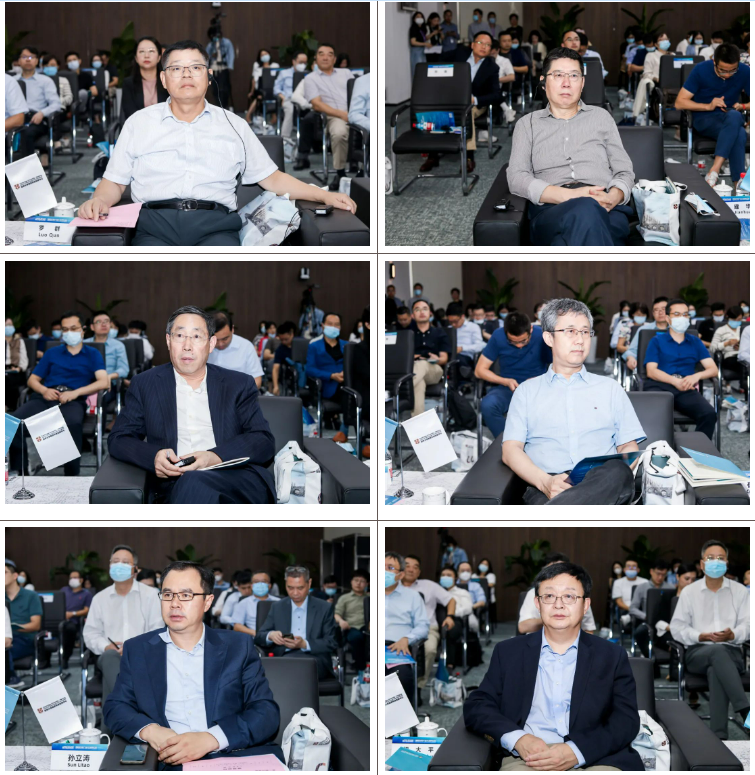
Fulfilling the mission of the universities and boosting regional development by commercialising scientific research
At the beginning of the forum, Wang Wei, Member of the Party Working Committee and Deputy Director of the Management Committee of the Jiangbei New Area, congratulated the convening of the forum on behalf of the Jiangbei New Area. He pointed out that CUNJC has become an important platform for in-depth integration between Jiangbei New Area and global innovation resources, and "I wish the Centre will continue to keep making full use of the high-end science and technology innovation resources of Cambridge to help Jiangbei New Area in building a modern industrial cluster in the Yangtze River Delta region".
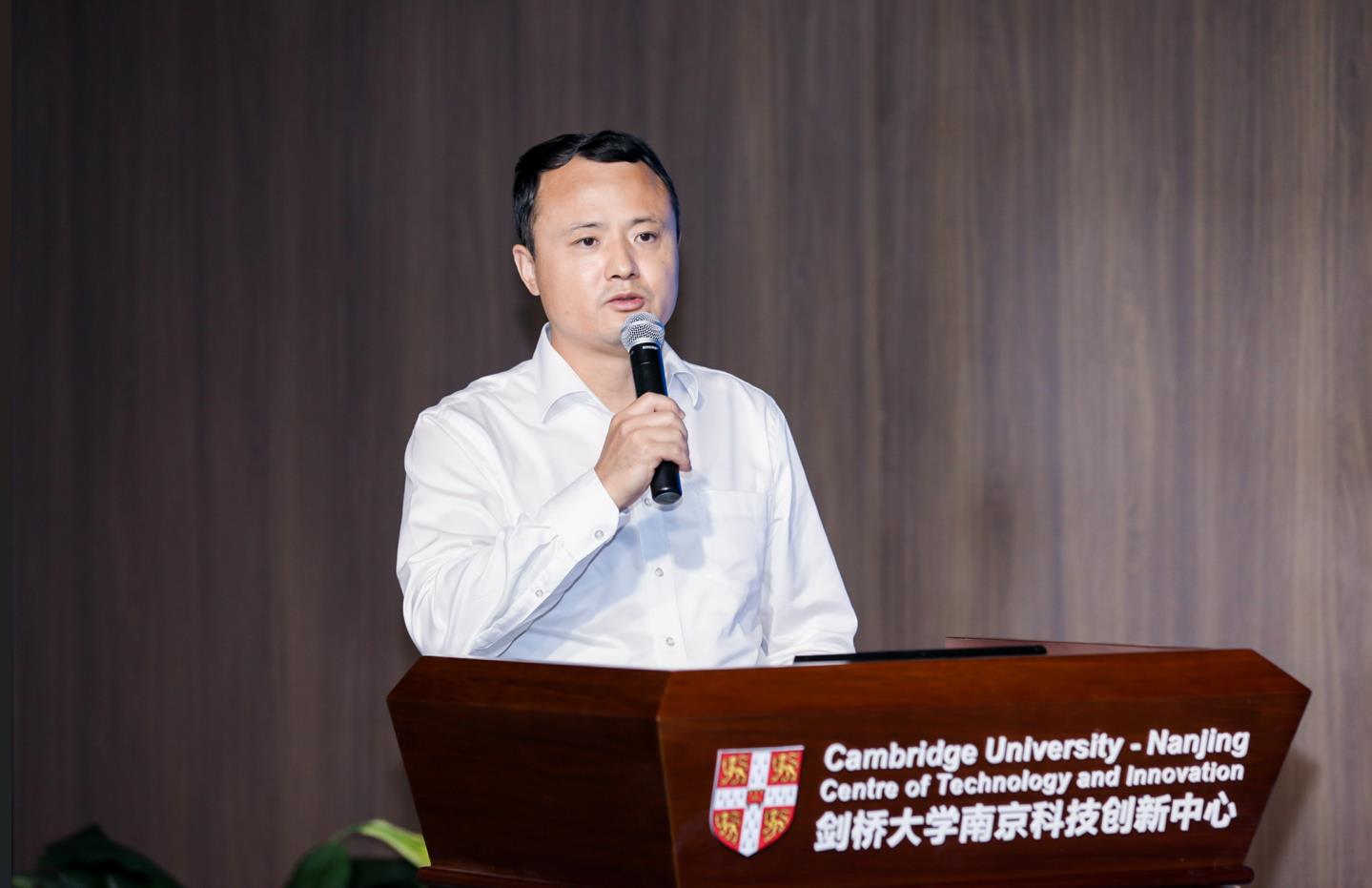
On behalf of the University of Cambridge, Anne Ferguson-Smith, Pro-Vice-Chancellor for Research and International Partnership of the University of Cambridge, congratulated the Centre on the success of the 4th Cambridge Nanjing Forum. She indicated that the University has always pursued first-class education, learning and research and has made "giving back to society through scholarship and knowledge" its mission and that the commercialization of research is a vital part of this mission.
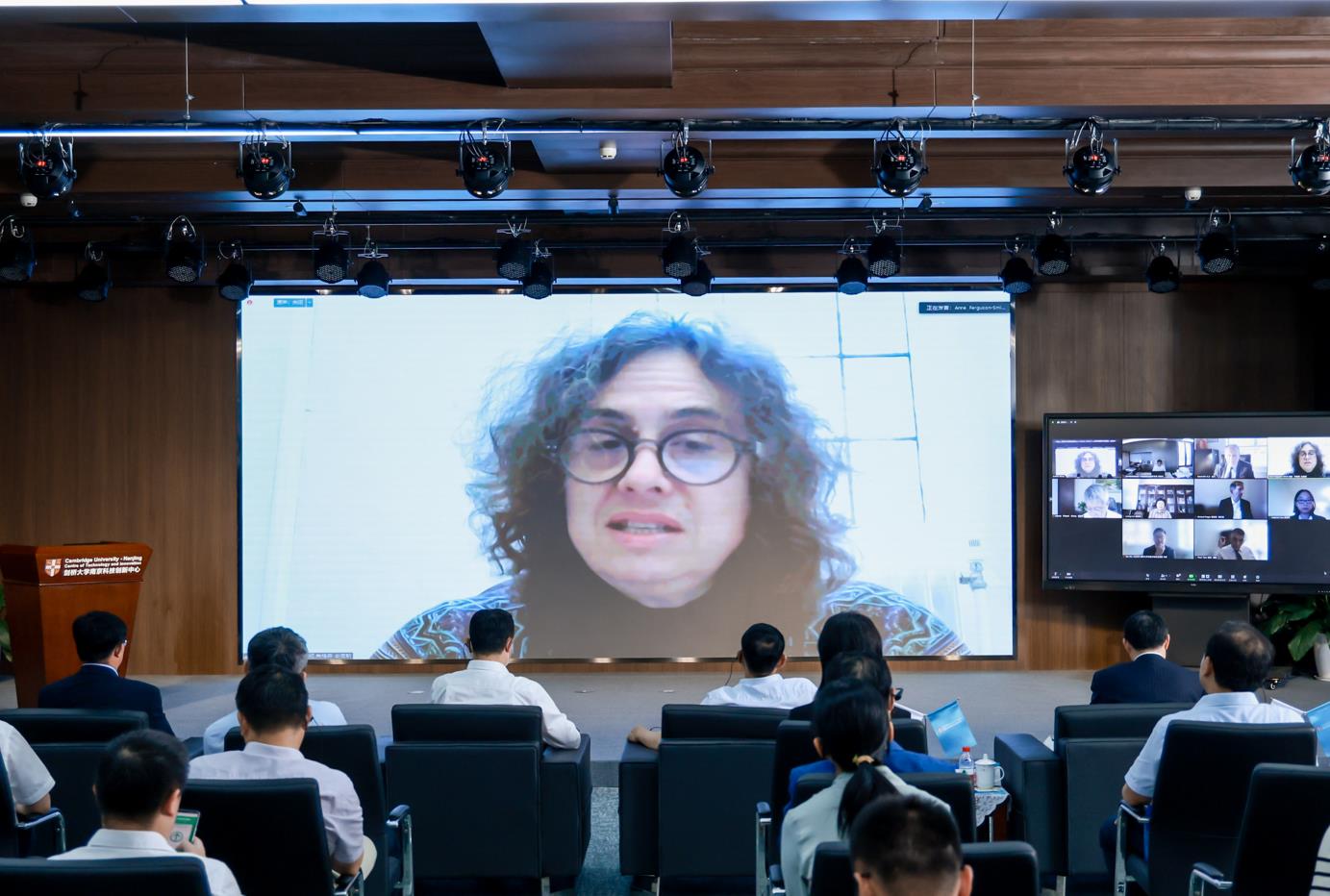
"CUNJC brings together top talents from Cambridge and top Chinese universities to work together in original basic research, applied research and commercialization. That is a unique model in line with the mission of the University," Professor Anne Ferguson-Smith emphasized. "We support research innovation and commercialization through CUNJC for the benefit of Nanjing, Cambridge and the whole society."
Lv Jian, CAS Academician and President of Nanjing University, said that a new round of scientific and technological revolution and industrial transformation is flourishing, which makes it even more pressing to deepen international cooperation at a strategic level of mutual benefits and sharing and to generate scientific research achievements contributing to the whole world.
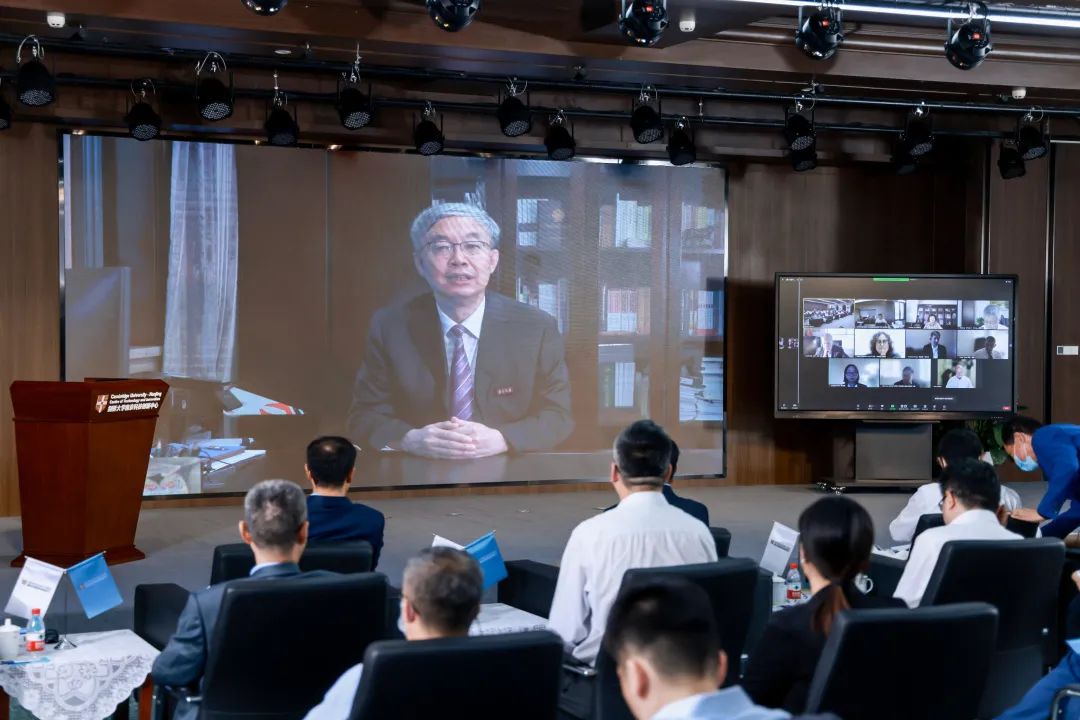
"The University of Cambridge is an important overseas partner for Nanjing University. Through CUNJC, an international cooperation hub, both universities vigorously carry out science and innovation cooperation to promote the in-depth integration of university development and local industrial needs", he said.
As Professor Anne Ferguson-Smith commented, "Commercialization of research is a key part of the mission of Cambridge". Cambridge's strengths lie in both basic research and its industrial application. According to the Global Innovation Index 2022 released by the World Intellectual Property Organization, the "Cambridge Cluster" is the most intensive technology cluster in the world. Though the area around Cambridge is only 1900k㎡, there are more than 5,300 high-tech enterprises, including world-class companies such as ARM, Solexa, AstraZeneca, etc. The five-year survival rate of startups invested by Cambridge Enterprise, the IP commercialization agency of the University of Cambridge, is as high as 92%.
What made the "Cambridge Cluster" and its innovation ecosystem possible? David Gill, Managing Director of St John's Innovation Centre Cambridge, and Peter Tyler, Professor of Urban and Regional Economics at Cambridge University, gave the answers.
Gill shared the localized practices of the University in promoting innovation of regional enterprises and the innovation ecosystems of Shandong University and Qingdao City, while Professor Tyler further explained the commercialization model of innovative technologies of the University.
"The four elements, namely the knowledge system, business system, finance system and place system and their interactions bring about the maximum enhancement of knowledge production and entrepreneurial vitality, which is the successful experience of Cambridge", concluded Tyler. In this innovation ecosystem, the knowledge system helps people develop ideas and acquire technologies, the business system covers businesses, consultancies and other economic institutions, the place system provides research sites and a range of infrastructure, and the financial system offers funding for businesses and infrastructure. They interact with each other and make "innovation" possible.
Connecting the dots on the R&D transformation chain and building a brand-new model of international scientific and technological cooperation
According to Qiao Yue, Professor of Economics at Shandong University, scientific and technological innovation is the source of long-term economic growth, whilst basic research is the foundation of scientific and technological innovation. He divided the transformation of innovation into four successive stages, i.e. R-I-D-M. R stands for research which discovers the laws of nature and human society; I is for innovation, which turns the laws into practical inventions; D means development which applies research to inventions at the industrial level; and M is for marketing, which caters to the demands of the market.
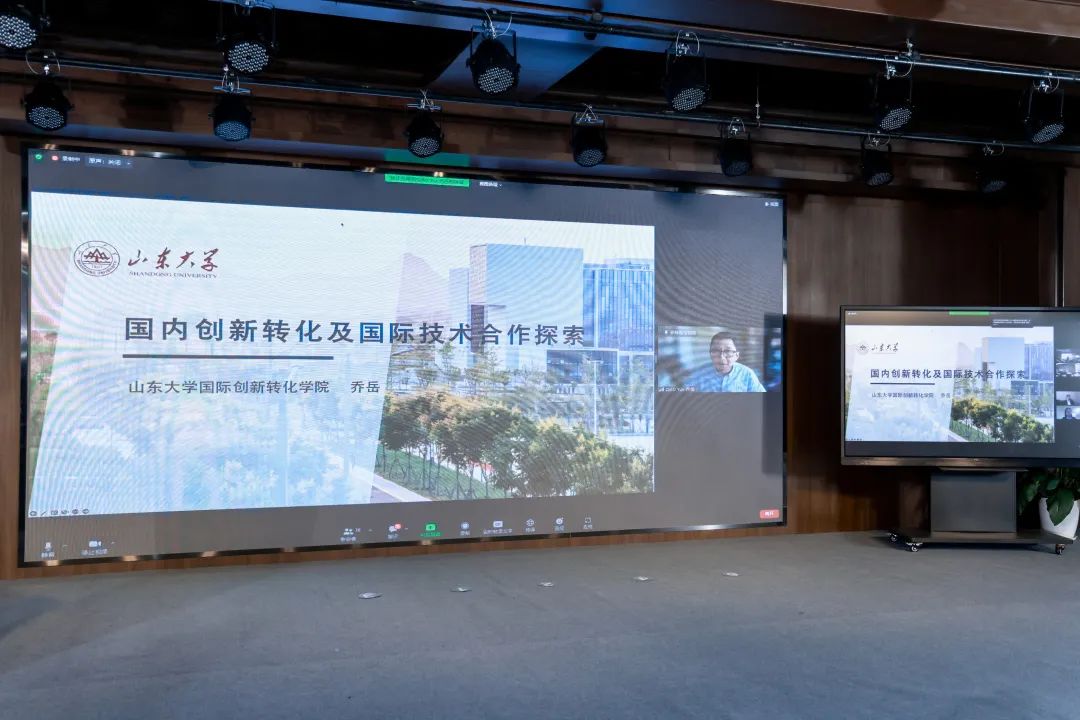
Based on the comparative analysis of the investment from scientific research funds in Western countries and the analysis of the current transformation of achievements in Chinese science and innovation carriers, Qiao Yue pointed out that the core dilemma of innovation transformation in China is due to the seriously insufficient research of "inventions", which lies in between basic research and the commercialisation, and this is the root cause of the so-called "bottleneck technologies" in China. Thus, he recommends that public funding for basic research should continue to increase, with a focus on applied research, particularly through international collaboration to build science, technology and innovation centres for "inventions" to open up the dual path of R&D of basic research - R&D-driven innovation and applied research - demand-driven innovation, and provide the impetus for sustained economic growth.
Based on the value chain of research innovation, Professor Daping Chu, Academic Director of the Centre, presented a report on "Cambridge University – Nanjing Centre – A Research Commercialization Model Based on International Collaboration and Local Innovation ". He argues that the complete R&D value chain consists of four stages: "original basic research, original applied innovation, technology development, and commercialisation". Basic research explores unknown fields. But it has high risks and takes at least 10-20 years to yield results. It is usually undertaken by universities and research institutes. Moving up the value chain, it takes 5 to 10 years to convert the results of basic research into applied research, 3 to 5 years to transform the results of applied research into technology development, and another 2 to 3 years for commercialisation. Market players like start-ups, unicorns and leading companies focus on technology development and commercialisation.
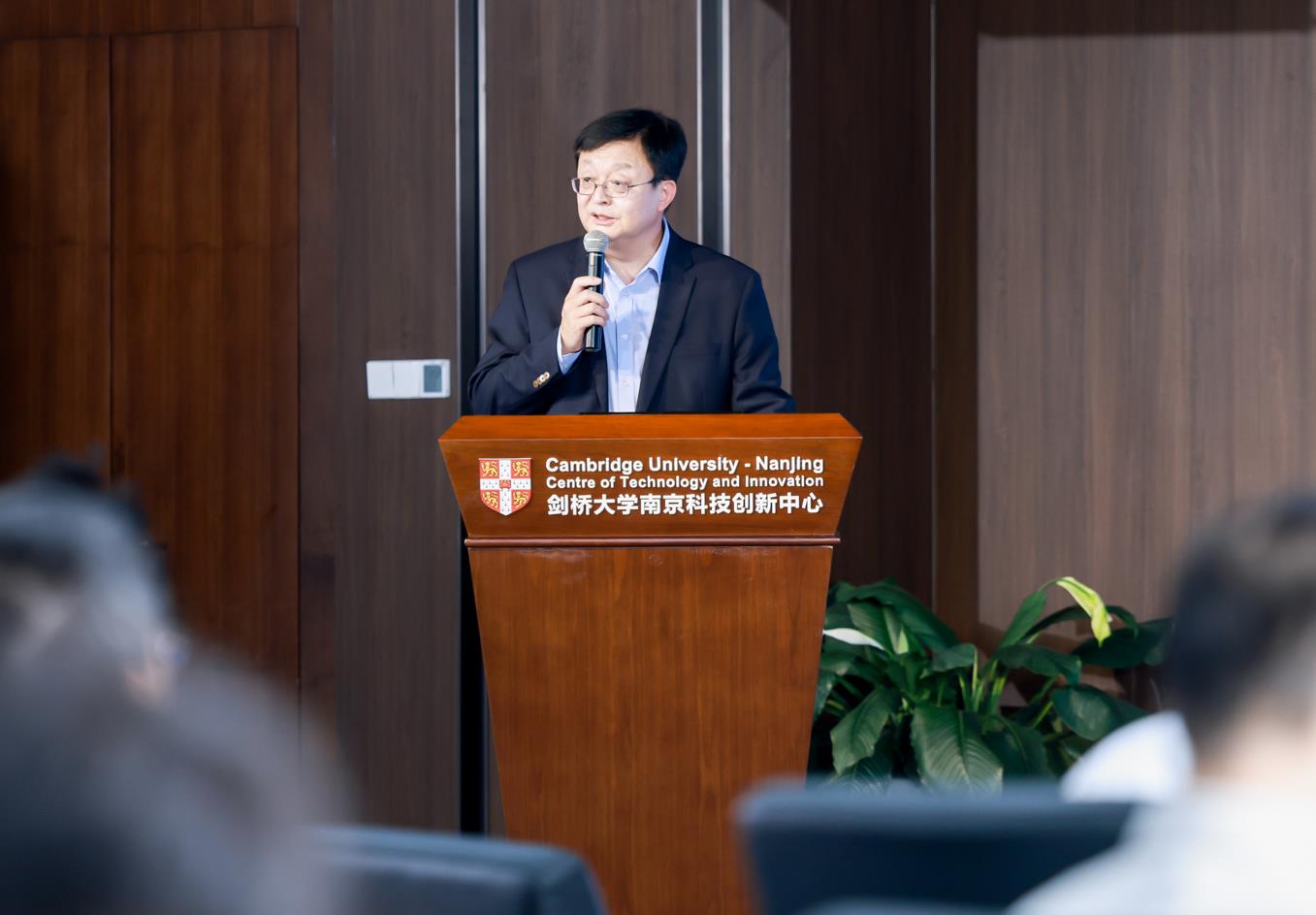
"The smooth translation from research to development cannot be realised without the intermediate link of application innovation," Chu stressed, "CUNJC is oriented towards original applied innovation research. The Centre starts from the intermediate link, matches cutting-edge technologies in the upstream, introducing Cambridge and international original research results as much as possible; and in the downstream, the Center combines local development strategies with market demands, developing innovative research and accelerating technological development and industrialisation."
"The Centre is committed to building a coordinated global innovation cycle among international political, industrial, academia, research and investment circles," Chu summarised. With the introduction of Cambridge's original achievements and top resources, and the support of industrial foundations, policies and talents provided by local governments, the Centre works with universities and leading enterprises to carry out applied research and technology development and export original technological results. Through technology transfer and start-ups, CUNJC actively introduces capital elements, serving the local economy and industrial upgrade.
Gaining fruitful results with a number of memorandums and an agreement for industrial-academic-research cooperation signed
Under the guidance of this new model of international scientific and technological cooperation, CUNJC gained fruitful results at this year's Cambridge Nanjing Forum, which was witnessed by relevant leaders at the provincial, municipal and Jiangbei New Area levels, the Pro-Vice-Chancellor and scholars of the University of Cambridge, and Chinese academicians and experts. In particular, a number of memoranda of understanding and an agreement were signed:
In university collaboration, Annie Ferguson-Smith, Pro-Vice-Chancellor for Research of the University of Cambridge; Sun Litao, Vice President of Southeast University; and Daping Chu, Academic Director and CEO of CUNJC, signed a memorandum of understanding on behalf of their organisations respectively to further promote multilateral cooperation and academic ties, including innovation management, technology transfer, innovation and entrepreneurship.
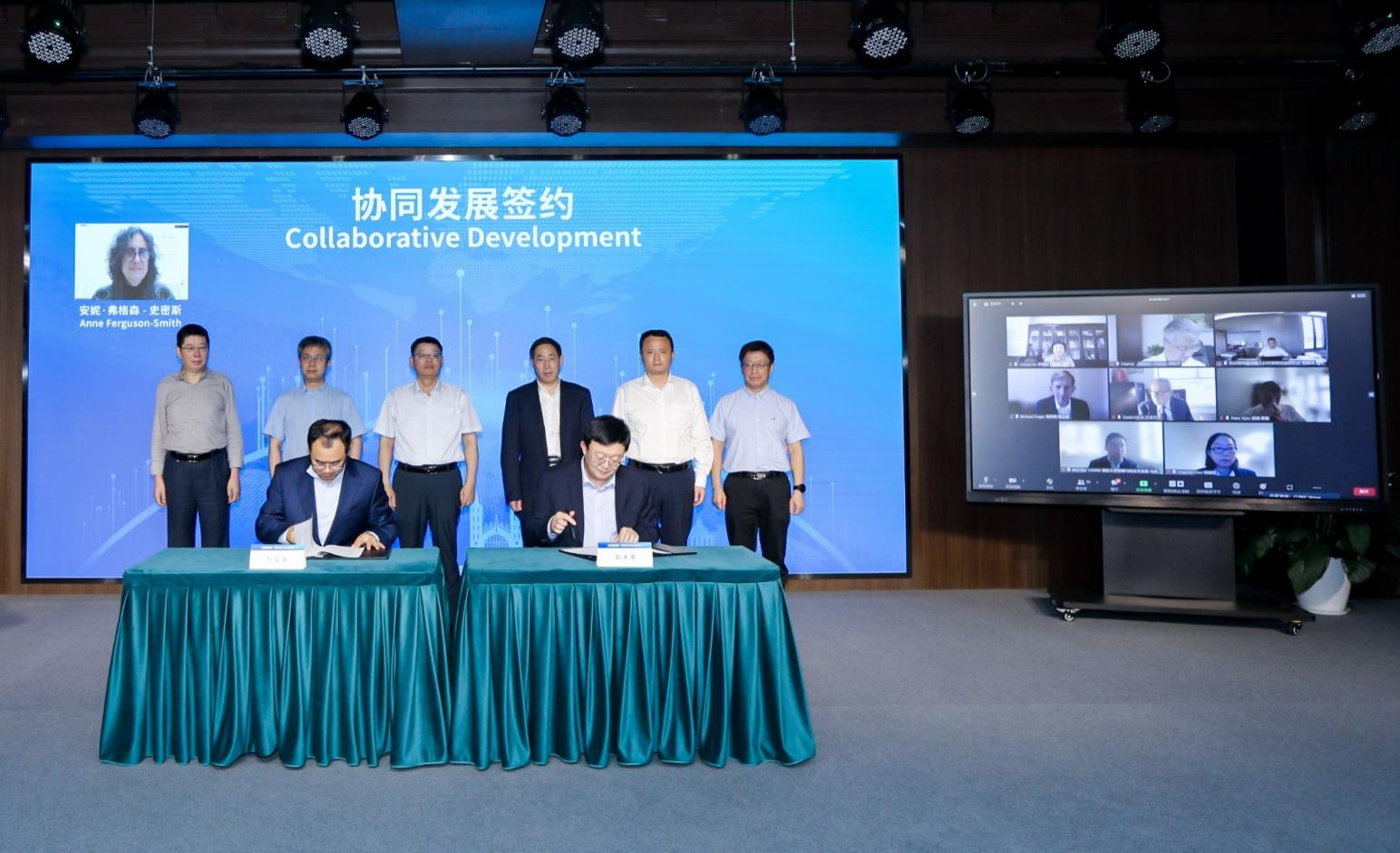
In the cooperation among scientific research institutes, Luo Benjin, Chief Scientist of the Yangtze River Delta National Technology Innovation Center and Jiangsu Industrial Technology Research Institute, and Albert Wu, General Manager of CUNJC, signed a agreement on behalf of their organisations to jointly promote cooperation in scientific research projects, organise relevant seminars, and carry out the international exchange.
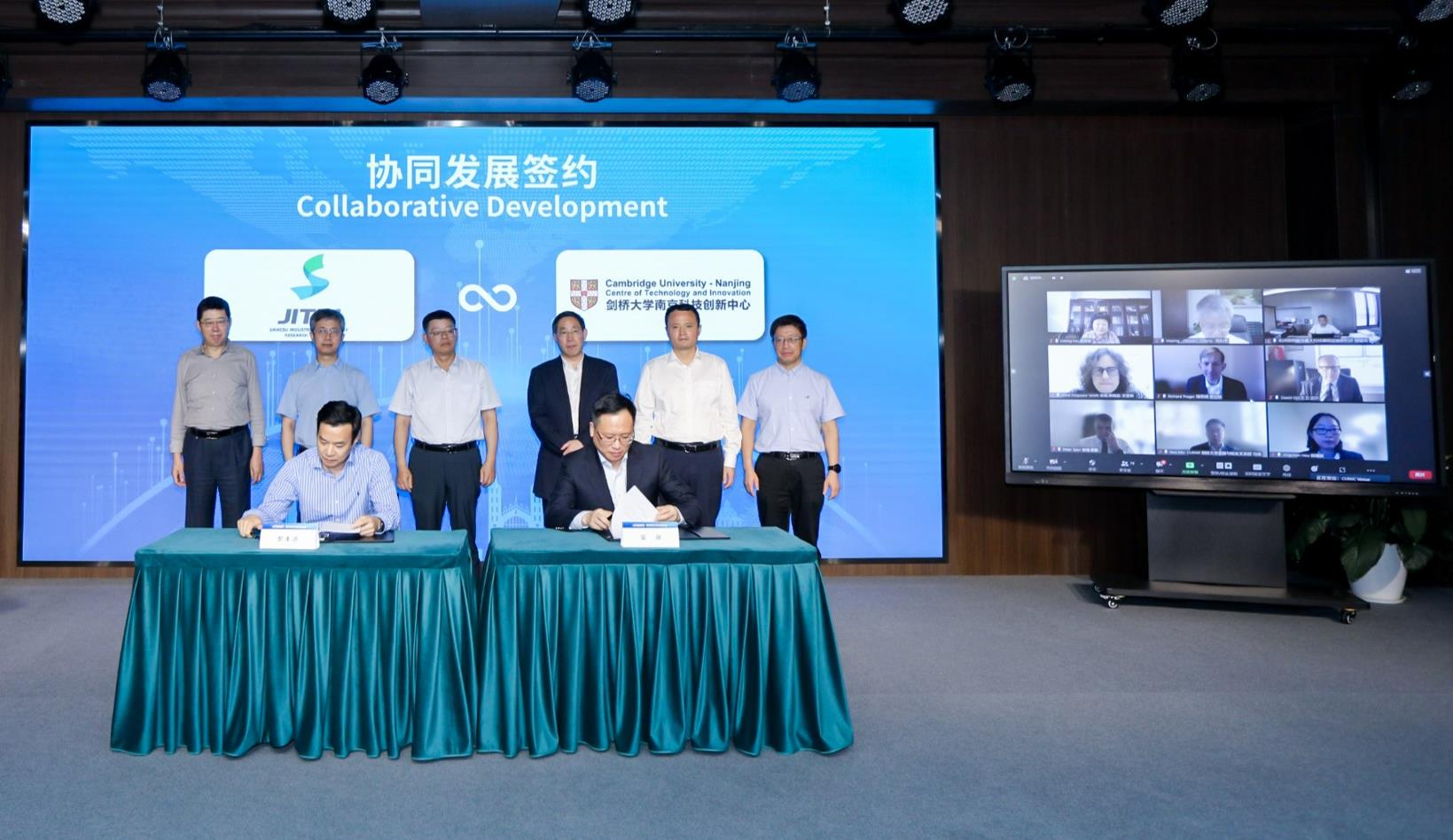
On the settlement of enterprises, four innovative tech firms established by Cambridge or Oxford alumni, namely Yuyuan New Energy, Whale Dynamic, BRI Data, and MUSYS Tech, signed agreements expressing their intention to settle in the Centre. All of them have participated in the Centre's "International Technology Roadshow Series". The Centre will continue to provide a favourable eco-system for innovation and entrepreneurship to boost the development of enterprises.
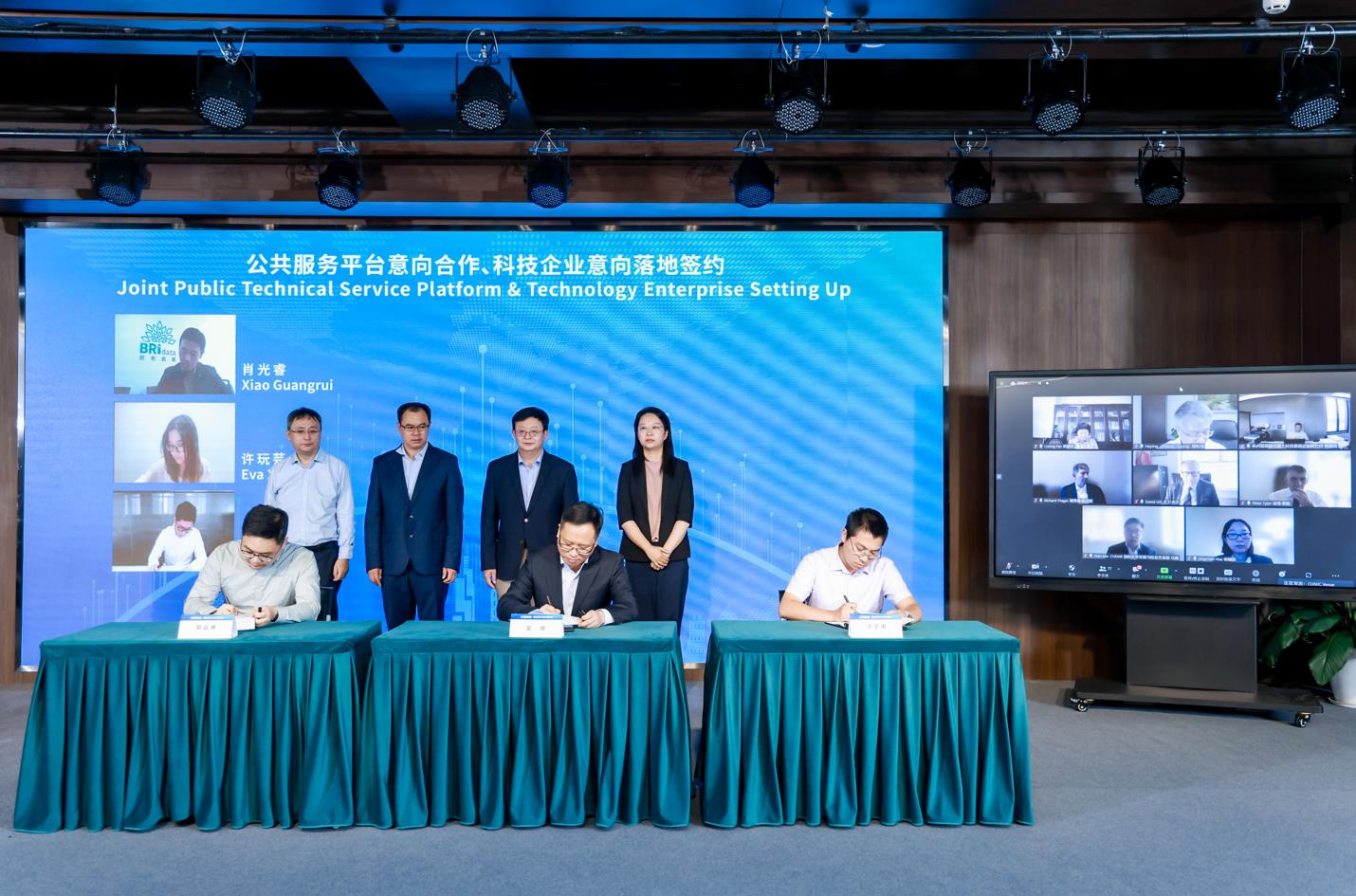
In public services, Deng Yuanbo, Founder and CEO of Nanjing ReaVis Technology Co., Ltd., and Wu An signed an agreement on the establishment of the "Public Technical Services Platform for Ultra-high-precision Optical Processing and Testing". The platform is mainly oriented towards "optoelectronic technology industry clusters", which is consistent with the development direction of leading local industries.
Scientific innovation flourishes in the land of booming industries. Shang Zhenbai, Deputy Director of the Science and Technology Innovation Bureau of Nanjing Jiangbei New Area, introduced the advantages of science and technology innovation in the Jiangbei New Area. He said that, in the context of the National Strategy for Integrated Development of the Yangtze River Delta, as the source of innovation, the leading area and the industrial growth engine built by Jiangsu Province, Jiangbei New Area strives to provide the best platform for scientific and technological talents and innovation projects.
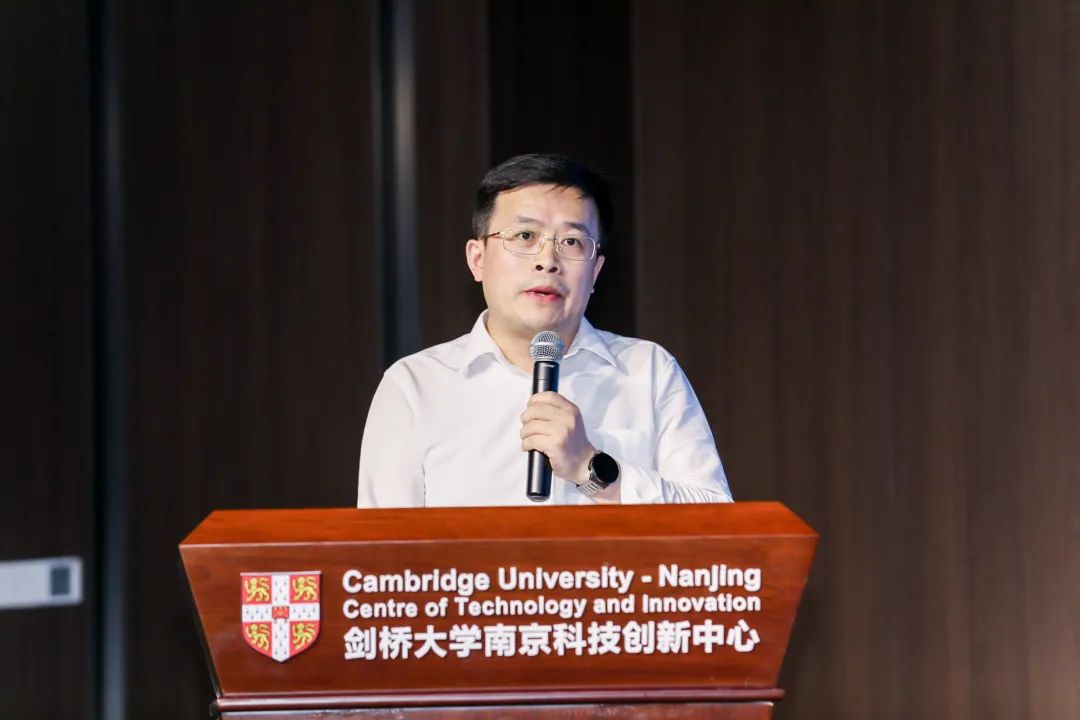
Enhancing platform capabilities to accelerate the commercialisation of start-ups
Relying on the new model of international technological cooperation at the Centre, a significant number of Cambridge researchers have successfully promoted their original and proven basic research findings at Cambridge to the stage of original applied research and technological development and established their start-ups at CUNJC to begin their commercialisation.
Initially an incubation project at the Centre, the "48V DC converter power system" research project has now been commercialised, and a spin-off company, Nanjing Nenglixin Technology Co., Ltd, set up. Nenglixin focuses on power solutions for XPU HPC chips and is dedicated to providing higher computing power with less energy. It has secured nearly RMB 10 million in funding.
"CUNJC has greatly facilitated the establishment and development of Nenglixin, including patent protection services and a large modern laboratory", said Cambridge Professor Long Teng, Executive Director of Nenglixin. "The Centre provides a 'harbour' for Cambridge researchers to incubate their ideas, helps them match up with the demand side of industries in China, and facilitates the further engineering and productisation of years of accumulated underlying scientific research. In this way, the commercialisation was eventually made successful."
Nanjing ReaVis Technology Co., Ltd. is a start-up devoted to creating industry-leading in-car head-up display (HUD) systems, aiming to achieve in-depth integration of driving information with real scenarios during driving. It has received tens of millions yuan in the Pre-A round of funding.
In the presentation titled "Road to Business: Platform", Dr. Deng Yuanbo, founder and CEO of ReaVis, shared that when introducing the HUD technology, which originates from Cambridge, ReaVis has received empowering assistance from a wide range of platforms, including Cambridge Enterprise, the IP commercialisation agency of the University of Cambridge; the Impulse Programme, a short-term training program for researchers organised by the University of Cambridge; CUNJC, a comprehensive supporting platform for the development of the University in China; and various roadshows and innovation & entrepreneurship competitions.
As an investment company focused on tech firms, Linear Capital has invested in multiple start-ups founded by Cambridge alumni. For example, it is the lead investor in the angel round of funding for ReaVis. At the forum, Huang Songyan, Managing Director of Linear Capital, said, "Facing the huge gaps between cutting-edge original applied research and technology development, and between product development to commercialisation, capital should play the role of a bridge narrowing these gaps, shape a triangular closed loop among original technologies, product development and commercialisation, and make original technologies the primary productivity once again".
Aimed to become a platform with international influence for independent innovation research, transfer and transformation of technological achievements, and resource pooling, CUNJC has held annual forums linking the University of Cambridge and Nanjing since 2019 and contributed to the development of tech innovation and entrepreneurship eco-system. Closely following the path of global research industrialisation, the Centre has integrated the "key links in the local commercialisation of Cambridge applied research results" into its development DNA, promoting the dynamic combination of international innovation and regional economic development.
VIPs at this year's forum also included: Ji Suying, Director of Europe and Africa Department, Foreign Affairs Office of Jiangsu Provincial People's Government; Xia Yan, Deputy Director of Foreign Affairs Office of Nanjing Municipal People's Government; Jiang Huarong, Director of Nanjing Jiangbei New Area Industrial Technology Research and Innovation Park; Song Haijiang, Deputy Director of Talent Work Division, Organization Department of Jiangsu Provincial Committee of the CPC; Ma Nan, Senior Associate Director - International (Asia), University of Cambridge Development and Alumni Relations; Hou Jingchen, Strategic Partnerships Manager for East Asia at University of Cambridge; James Pan, Academic Publishing Asia Director of Cambridge University Press; Dr. Tony Raven, former CEO of Cambridge Enterprise; and Shirley Jamieson, International Associate, Former Head of International Relations and Outreach Programmes of Cambridge Enterprise.

 中文
中文 English
English
